
Putin's hands in Europe: how Russia shapes public opinion in EU
Russia strategically influences EU public opinion through various methods amid global information warfare and cyber threats, aligning with its long-term ambitions and interests
In today's world of information warfare and cyber threats, influencing public opinion is becoming a key tool in the geopolitical struggle. Russia, with its long-term ambitions and strategic interests, is actively using various methods to shape public opinion in the European Union to suit its agenda.
Contents
-
Russia's propaganda and disinformation
-
Russian media and social networks in Europe
-
Involvement of politicians
-
Spikes in the activity of the Russian network
-
Russians are actively using Telegram.
-
The Kremlin's European hands
Controlling the media is one of the most obvious tools. Russian state and private media outlets, such as television and radio, often cover events from a pro-Russian perspective in an attempt to influence the perceptions and opinions of EU citizens.
Russian and pro-Russian propaganda media outlets manipulate facts and create fake news using propaganda and disinformation, which distorts reality and exacerbates societal divisions. This includes not only traditional media but also social media, where fake accounts, bots, and trolls spread propaganda and disinformation.
Cyberattacks and hacking are more covert but no less effective methods. This strategy includes interference in electoral processes, theft of confidential information, and even attacks on critical infrastructure.
Political influence includes providing financial and other support to political parties and movements in the EU that share Russian interests by providing them with financial and other support.
These methods aim not only to shape public opinion but also to change behavior and political beliefs of Europeans. They affect international relations, economic stability, and security in the region.
Espreso has examined key aspects of Russian influence in Europe, and has discussed it with experts.
Russia's propaganda and disinformation
Many European countries harbor animosity towards Russia. This includes intelligence agents who have been building their cover for years. For example, consider the case of the Russian spies Maria Rosa Mayer Munoz and Ludwig Gisch (Anna Valerievna Dultseva and Artem Viktorovich Dultsev), who were exposed in Slovenia.
In addition to outright spies, Russian media and propagandists are actively working in the EU (research by the Institute for Innovative Governance) and developing NGOs, including through the church.
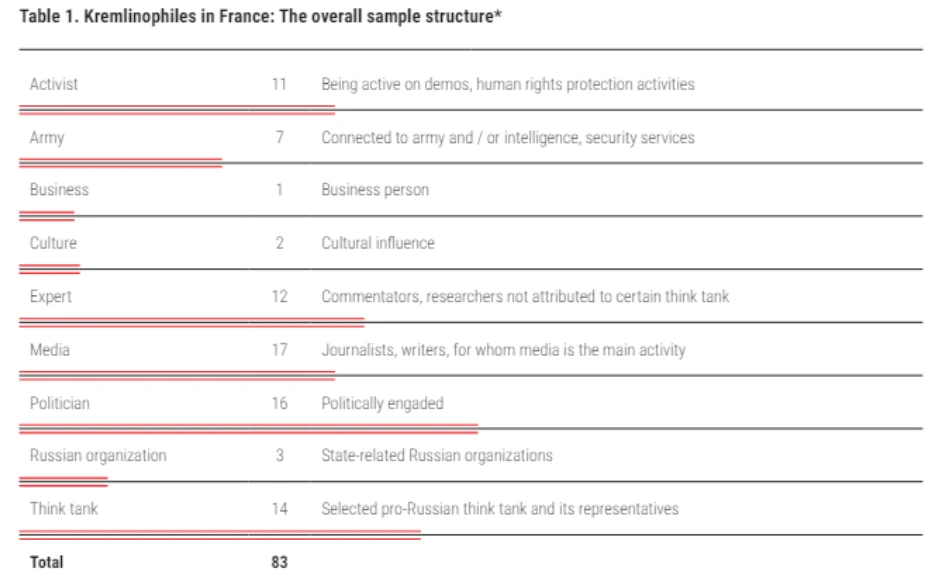
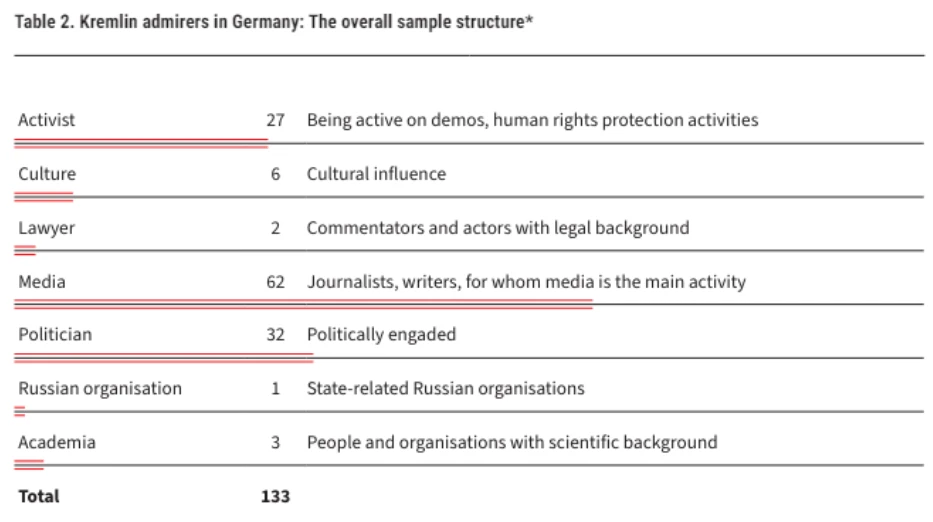
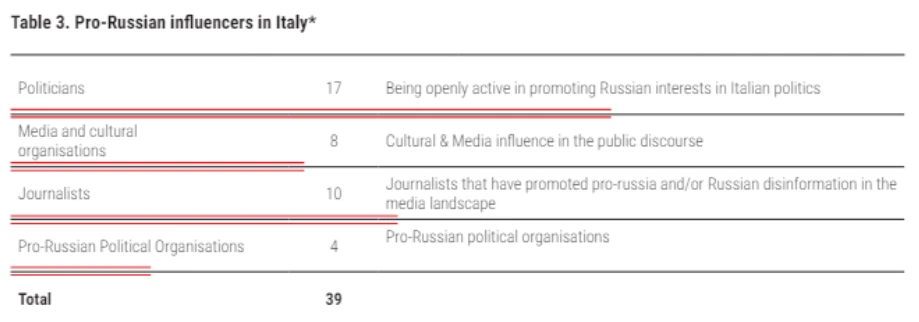
An independent OSINT agency, Molfar, provides several examples of such activities:
Example 1: In 2022, a study by the Center for Monitoring, Analysis, and Strategy in Germany showed that 40% of Germans partially or completely agreed with the statement that Russia's war against Ukraine was a necessary response to NATO provocations. This is the result of Russian disinformation campaigns aimed at justifying aggression against Ukraine (DW).
Example 2: In June 2023, France detected a large-scale disinformation campaign that included the creation of fake web pages that mimicked French media and government websites. The goal was to spread fake news against Ukraine (DW).
Example 3: In March 2024, NATO StratCom detected a narrative in the Russian media about NATO and Ukraine's involvement in the terrorist attack at Crocus City Hall in Moscow (study).
For the purpose of reinforcing the "disinformation," the Russians are also stepping up their actions. As early as 2023, the Polish newspaper Nowiny Polskie wrote about Russia's plans to intensify anti-Ukrainian actions, particularly in France and Belgium. Russian propaganda would use recordings of ongoing demonstrations against pension reform in France to organize massive pro-Kremlin protests, and anti-Ukrainian rallies would try to gather their few "supporters" near the epicenters of anti-government activity. At the time, the focus was on the outrage over the supply of fighter jets to Ukraine.
Already in June 2024, amid discussions about sending Western troops to Ukraine, a similar performance took place in France again: unknown persons left coffins with the words "French soldiers in Ukraine" near the Eiffel Tower. The police managed to detain all those involved. Moldovan citizens, also detained, repeated a similar "performance," but with graffiti, on June 7. Chisinau condemned the actions of its citizens.

June 2 Coffins with the inscription "French soldiers in Ukraine" are found near the Eiffel Tower
Russian media and social networks in Europe
Media and other online platforms are the main tools for spreading disinformation and propaganda. Investigative media has previously reported that various media outlets, including far-right, far-left, conspiracy, and pro-Russian propaganda, such as RT and Sputnik (part of the Rossiya Segodnya holding), actively contribute to the dissemination of pro-Russian narratives across Europe. Moreover, a multitude of experts from universities, think tanks, and journalists, positioning themselves as experts on Russia and Ukraine, promote the messages of the so-called "Russian world". Numerous bilateral "forums," "dialogues," "associations," etc. also work for Russian interests.
Spread of Russian propaganda in Germany
For example, let's take Germany, which is one of the priority targets for Russian propaganda. In 2014, Russian media launched a German-language outlet, RT in German. However, it only aired for German viewers from December 2021 to February 2022. At the same time, RT Deutsch/RT.de and the Sputnik radio network, completely deprived of access to major social media platforms in the European Union, continue to release propaganda materials in German on international domains such as https://de.rt.com/, https://rtde.live/, https://rtde.me/, and others.
For a long time, the RT.de Telegram channel played a leading role in spreading disinformation and conspiracy theories among other pro-Russian Telegram channels in the German-speaking community. RT DE was the most widely used source of information during the first week of the war through its Telegram channels and groups.
Sputnik news agency. Quotes from Putin, Foreign Minister Lavrov, and other spokespersons spreading Russian propaganda narratives are standard on this site. SimilarWeb data shows that although SNA (Sputnik News Agency) has modest numbers—less than 150,000 visits in August 2023—the German service RT is more popular, with 4.8 million visits. Sputnik, on the other hand, goes beyond its traditional audience by creating propaganda channels on platforms such as TikTok.
Thomas Röper and Anti-Spiegel
Thomas Röper from St. Petersburg runs the blog "Anti-Spiegel," which disseminates Russian propaganda, disinformation, and fake news about Russia's aggressive war. Röper also frequently appears on the propaganda YouTube channel "Voice of Germany" ("Voice of Germany"), run by Berlin-based blogger Sergei Filbert. Filbert also runs the Telegram channels "Voice of Germany" and "Druzhba FM," endorsing and justifying Russian aggression in Ukraine and promoting the Russian worldview while supporting far-right and far-left movements in Germany.
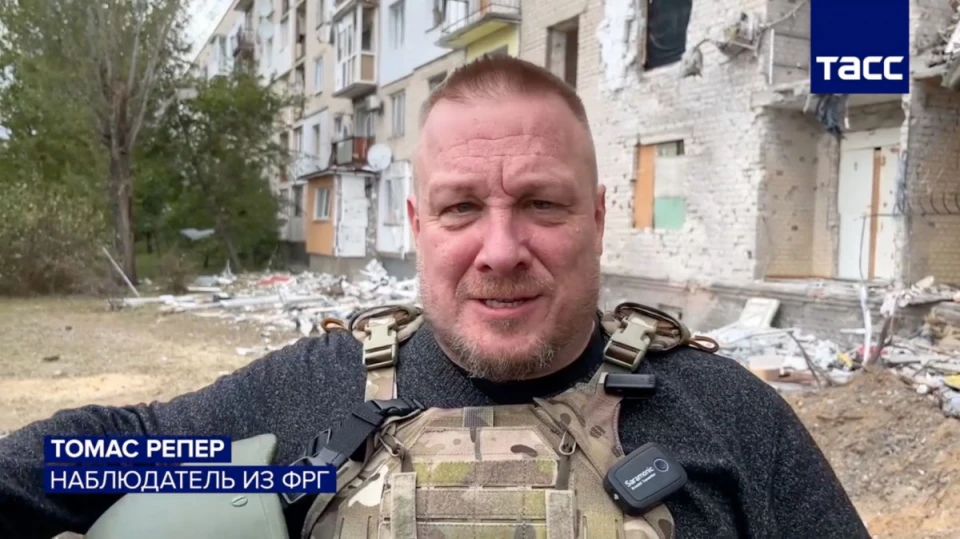
Wilhelm Domke-Schulz, a journalist and filmmaker who has produced several documentaries in defense of the Russian government and military (Remember Odesa and Living and Dying in Donbas) and worked with Thomas Röpper (on Living and Dying in Donbas), is also known to be engaged in similar propaganda activities. He also appeared in the project of the NATO Investigative Committee propaganda initiative by Sergei Filbert, as well as in the electronic "leaks" of the Concord company by Yevgeny Prigozhin, the former warlord and head of the private military company Wagner Group (accused of alleged war crimes in Ukraine, Syria, and Africa), as one of the beneficiaries of Prigozhin's information campaigns in Germany.
This is only a small part of what is actually working in Germany for Russia's benefit. There are many different magazines, blogs, and individual journalists who directly cover Russian narratives, even though they are not directly part of Russian pseudo-media.
Germany is home to the largest number of so-called Russian influence agents—politicians, the church, NGOs, and "experts," according to the Texts interactive map, which this article has already referenced. There are slightly fewer in France and Italy, and even fewer in the UK. However, it should also be understood that such pro-Russian elements exist in almost every European country.
Examples from the Molfar investigation:
-
Example 1: In 2022, Russian propagandists used social media to spread false stories about Ukrainian ‘biological laboratories’ funded by the United States that are allegedly developing biological weapons (DW).
-
Example 2: In 2023, a campaign called "Doppelgänger" created fake articles imitating well-known German and French media outlets to spread disinformation about the war in Ukraine (DW).
-
Example 3: In 2023, the French agency for countering external disinformation, Viginum, exposed a network of "pravda" websites with servers in Russia that spread disinformation about the war in Ukraine. The websites were targeting French, Polish, Spanish, English, and German-speaking countries. The study also revealed a similar ecosystem of 41 "-news.ru" sites created in 2022, as well as a "historical" ecosystem of 147 sites with the names of Ukrainian and Russian cities in their domains. The sites were created with the same graphic design and shared common IP address characteristics (study).
Politicians' involvement
Of course, as already mentioned, the Russians are actively using pseudo-experts in their disinformation. For example, the Institute for Innovative Settlement's study also lists pro-Russian political experts and commentators in Germany.
"Alexander Rahr is one of the most famous pro-Russian political and economic experts and commentators for the German-speaking audience. He is a German management consultant and historian of Eastern Europe, as well as a lobbyist for the Russian gas company Gazprom and the Russian government of Vladimir Putin," the study says.
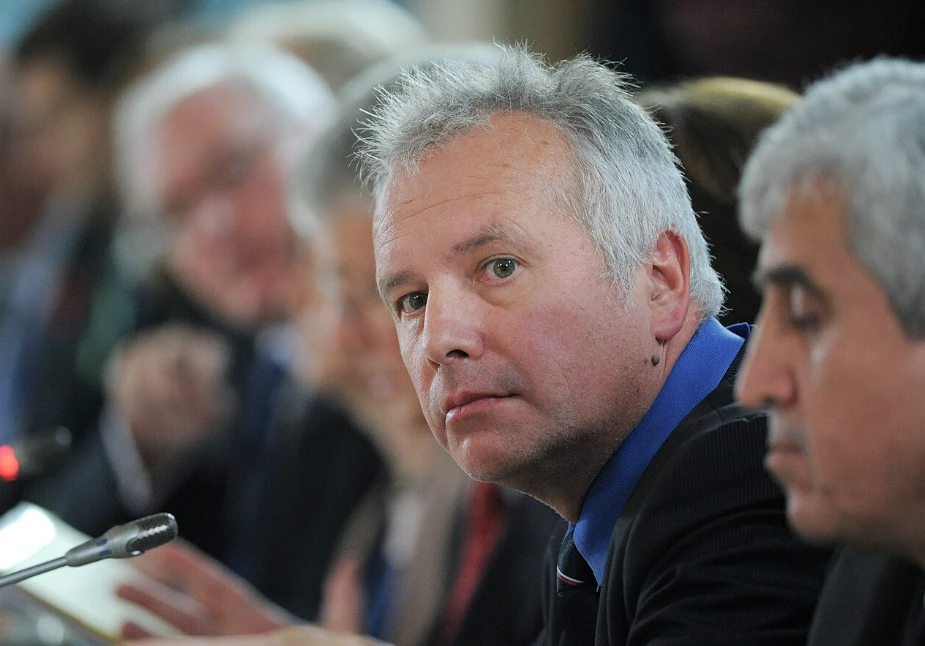
For example, it spreads Russian propaganda narratives about Ukraine's lack of sovereignty (with Russia and the West acting as opposing forces), the inevitability of Putin's victory in the war, and the restoration of normal economic relations between Russia and the West after Ukraine's defeat.
As noted by Detector.media, the risk is the willingness of domestic political players in the EU to meet Russian propaganda, using its narratives to position themselves in the internal political struggle.
"Resources favorable to the ruling parties in Hungary and Slovakia are entering into an information alliance with Russian propaganda media. Many eurosceptic opposition movements in other European countries do the same," they wrote in their article on propaganda outlets.
Another striking example of activities in favor of Russia is the blockade of the Polish-Ukrainian border. In late 2023 and early 2024, Polish freight carriers and farmers blocked the Polish-Ukrainian border, protesting against the import of agricultural products from Ukraine, although Poland actually had a ban on imports of Ukrainian grain. In particular, the main demand of the carriers was to return the old system of permits for Ukrainian companies to transport goods, with the exception of humanitarian aid and goods for the Armed Forces. In fact, they were also blocking cargo for the Ukrainian army.
The Polish far-right party Confederation played a key role in this blockade. The Confederation's representatives oppose sanctions against Russia and use pro-Russian rhetoric. Rafal Mekler, the leader of the carriers' protest and the head of the Confederation's branch in Lublin Voivodeship, along with several other party members, have already been identified as Russian agents, Konstantin Kuzmenko, Molfar’s Chief Business Development Officer, told Espreso.
Indeed, the act of one of the farmers placing a poster with the slogan "Putin deals with Ukraine, Brussels, and our rulers" is worthy of note.
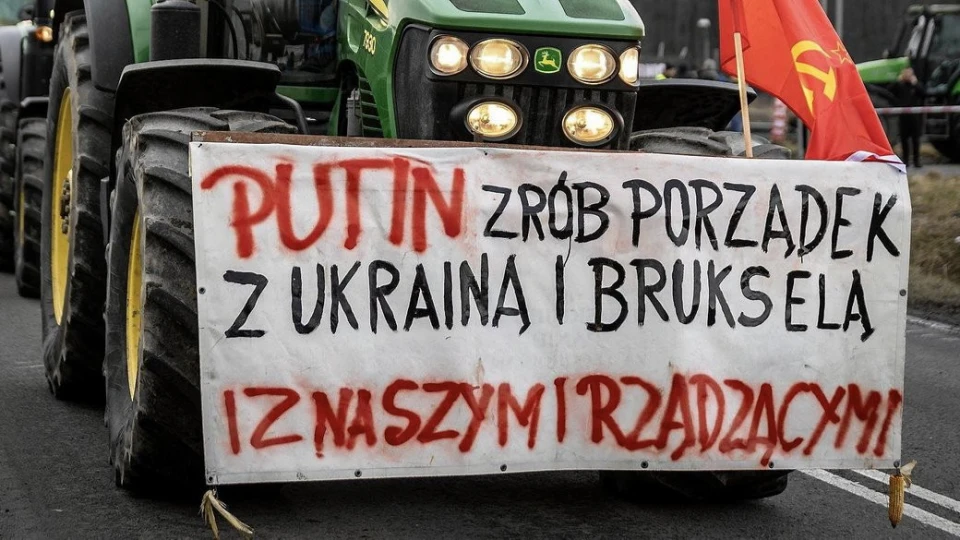
As Molfar reminds us, in February 2024, Polish farmers extended their protest to the borders with Lithuania, arguing that Ukrainian grain was being passed off as Lithuanian and imported into Poland. Lithuanian Prime Minister Ingrida Šimonite said that this rhetoric "looks like the Kremlin's attempts to pit Ukraine's two biggest allies against each other." Lithuanian Foreign Minister Gabrielius Landsbergis said that "this resembles some hybrid operations that are intensively exploited by Russian propaganda."
We should also mention the NGOs, associations, etc. under whose umbrella Russia operates in the EU. Let's take the situation in France as an example.
Among the Russian organizations in France is the Russian House, which actively operates and promotes cultural propaganda through concerts, films, trips, and so on. The same Russian House is represented by the Russian Geographical Society in Paris, which awards French travelers with Russian awards. Also worthy of special attention is the International Committee for the Protection of Human Rights (CIPDH), which positions itself as a partner of the UN but clearly presents itself as a pro-Russian agent of influence. One investigation found that almost 70% of the organization's leadership consisted of fake profiles.
The organization is based on a combination of criminal activities and fraudulent schemes involving African gold, and their sanctioned leader is directly linked to the FSB. At least two of the organization's top managers have close ties to the Russian military and intelligence services. These are Vitaly Ginzburg, a self-proclaimed former Russian military intelligence officer, and Alexander Ionov, acting vice president of CIPDH. The United States has recognized Ionov as co-opted by the FSB, and he also cooperates with the project of the deceased Prigozhin (Yevhen Prigozhin, former owner of the Wagner PMC, Ed.) to spread disinformation.
One should realize that this is a small part of what is really happening because, for example, in France, the Russian church has a large representation. In addition, there are hundreds of local Russian organizations that have relocated to France. They are united by the Coordinating Council of Compatriots of France, an umbrella organization of the entire Russian diaspora in the EU, associations, and structures. In addition to providing general support and interaction between different participants and organizing joint events, such as the propaganda march "Immortal Regiment" using the Z war symbol, the Council provides legal assistance to displaced persons.
After Russia's war against Ukraine in 2014, and especially after the full-scale invasion in 2022, official propaganda began to spread a narrative of generalized Russophobia in Europe and the world. Since then, the Coordination Councils and the legal centers established there have been tasked with "protecting compatriots" from "discrimination on national grounds."
The Russian World Foundation also has a network of partners in the EU, including France. As a rule, the foundation itself does not have a separate office, but there may be so-called "Russian World Centers" and "Russian World Rooms," which are usually a cross between a specialized classroom, a library, and a conference room with relevant literature, the organization of "readings," concerts, round tables, etc.
Spikes in the activity of the Russian network
The EU declares that it understands the threat of Russian disinformation and has begun to counter these meddling efforts.
"Russian disinformation activities usually intensify during election campaigns. Many state-level cases of Russian interference in US elections have been described and even investigated. "As we saw in 2024, such interference also occurs in Europe, both at the level of individual states and during the European Parliament elections," comments Konstantin Kuzmenko.
Thus, in February 2024, the European Parliament adopted and published the resolution "RussiaGate: Accusing Russia of interfering in democratic processes in the European Union."
The resolution emphasizes the dangers of Russia's spy network expansion in Europe and Russia's disinformation campaigns, according to the report. We should expect increased interference and manipulation of information by Russia in the run-up to the 2024 European elections. Separately, the resolution notes "Russia's policy of using culture as a weapon to achieve the Kremlin's goals and using Russian citizens working in this field as agents of influence and spies."
Operation BIS
One of the largest control operations known in the last six months is Operation BIS (Czech Security and Information Service). It managed to uncover and describe the activities of an influential network funded by Russia and operating in the Czech Republic. The BIS operation revealed how Russia influences EU countries' territories and tries to influence political processes in individual countries.
"Based on the BIS information, the Czech government imposed sanctions against Viktor Medvedchuk, propagandist Artem Marchevsky, and the Czech company Voice of Europe, a legal entity of a news website that spread Russian disinformation in the EU.
Czech Prime Minister Petr Fiala said at a briefing after the government meeting: "With this step, we have decided to strike a pro-Russian network that was trying to launch an influence operation on our territory, which would have serious consequences for the security of the Czech Republic and the EU." The EU also imposed sanctions against Voice of Europe in May 2024, as Konstantin Kuzmenko summarizes.
In April 2024, Belgian Prime Minister Alexander De Kroo announced the launch of an investigation into Russia's alleged interference in the European elections. According to him, Belgian intelligence has confirmed the existence of a network that is trying to undermine support for Ukraine from European partners. Furthermore, De Kroo noted that the goal of this network was to help elect more pro-Russian candidates to the European Parliament and strengthen a certain pro-Russian narrative in this institution.
Previously, European politicians and investigative journalists have also claimed Russian interference in elections in France, Germany, Italy, and Poland, as well as referendums in Spain and the United Kingdom. The Russians are closely monitoring Europe's situation and changing their narratives in response to new acute situations.
"In addition, the Russian Federation intensifies its efforts during times of destabilization in certain EU countries." In particular, the aforementioned European Parliament resolution (RussiaGate) notes the report of the European Center for Combating Hybrid Threats on Russia's activities to destabilize Spain. It refers to the ties between the Catalan separatists, including representatives of Catalonia's regional government, former regional president and current MEP Carles Puigdemont, and Russia," adds Mr.Kuzmenko.
Russians can change narratives to reflect the current situation. For example, according to the French agency for countering external disinformation, Viginum, after French President Macron's statements about his readiness to send troops to Ukraine, pro-Russian disinformation groups shifted their focus from supporting the war in Ukraine to criticizing internal problems in France and attacking President Macron personally.
Russia's use of Telegram for disinformation

In April, Ukraine raised the issue of banning another social network due to the potential information threat it presents. We are talking about Telegram, from which many Ukrainians receive information that is often critically harmful. While this issue remains unresolved in Ukraine, reports in Europe indicate that Russians are actively exerting their influence through this network.
In this context, Molfar reports the discovery of a network of 10 German-language TV channels in Germany that endorses Russia's war in Ukraine, disseminates fake news, and backs the far-right Alternative for Germany party. Following the start of the full-scale invasion, Germany banned Russian propaganda media RT and Sputnik, resulting in the appearance of six of the 10 channels.
Over the course of a month, more than 50,000 accounts on the social network X (formerly Twitter) posted more than 1 million tweets in German, frequently accusing the federal government of neglecting its own population to support Ukraine. Experts described it as a "systematic Russian disinformation campaign."
The French Viginum exposed the use of Telegram channels to disseminate fake anti-Ukrainian content from duplicate global media websites. Viginum also investigated the "pravda" Telegram channel network, which duplicates the content of a network of propaganda websites that spread disinformation to European audiences.
It is worth noting that Telegram remains the most problematic platform, according to a study by NATO StratCom.
Molfar Agency comments, "At the same time, Russians are actively working to create and develop influence groups aimed at the audiences of individual countries, including the United States, France, and Finland."
The NATO StratCom study found 17 groups of accounts that spread propaganda and disinformation in a coordinated manner, mainly through Telegram (53%) and X (12%), with six-thirds of the channels operating on two platforms at once, such as Telegram and VK or Telegram and X. Most of them (67%) are Russian-language, 17% are English-language, and there are also channels in French and Finnish.
The Kremlin's European hands
We asked the Molfar experts whether the above cases could be associated with the Russian network of agents of influence, given the significant activity of Russian agents and spies in the EU.

The European Parliament's resolution, as they pointed out, states that Russia has established contacts with parties, political figures, and movements to rely on those active in the Union's institutions to legitimize Russia's stance, support separatist movements and proxy governments, and insist on easing sanctions and mitigating the effects of international isolation. It also asserts that "MEPs from certain political groups, as well as some independent MEPs, are spreading outright pro-Kremlin propaganda in the Parliament." In other words, the European Parliament directly links Russia's development of an agent network, a political influence network, and the spread of Russian propaganda.
"Stunned by credible reports that shed light on Russia's attempts to foment divisions among European citizens by recruiting MEPs as agents of influence, as well as its efforts to systematically create a system of dependencies through European political parties, which then act as amplifiers of Kremlin propaganda and serve its interests," the resolution also says.
Also, the Czech media, citing intelligence sources, reported after the BIS operation revealed that politicians from Germany, France, Poland, Belgium, the Netherlands, and Hungary had received money from Voice of Europe to influence the upcoming European Parliament elections.
"In this case, the disinformation network members were directly involved in building a network of Russian agents. At the same time, it is also quite natural that Russian intelligence services, which oversee agent networks in Europe and disinformation activities, try to organize their work in such a way that the interconnection of various Russian elements of influence is not visible in the public sphere," summarizes OSINT expert Kostiantyn Kuzmenko.
He added that this is why, in most cases, the connection between the persons involved in spreading Russian propaganda in the EU and members of the Russian agent network has not yet been proven.
- News













































